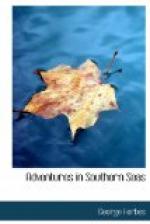It was not until we had lost sight of land, and when I felt the call of the sea, that I ceased to mourn my lost Anna, and realized my obligation to live what remained to me of life in such manner as an all-wise Providence might determine.
CHAPTER XXVIII
THE MOLUCCA ISLANDS
On this voyage to the place of the painted hands Dirk Hartog resolved upon a different route from that taken by former navigators to the Great South Land, and within three months of leaving Amsterdam the “Golden Seahorse” came to anchor among a group of islands to the north of New Holland known as the Molucca Islands, first visited by Sir Francis Drake in the “Pelican” during the year 1579.
The competition between England and Holland for sea supremacy was at this time very keen, and the ships of both nations sometimes carried a broom at the masthead to signify the sweeping of the ocean. We found, however, no English or other vessels to dispute with us our landing at the Moluccas, where the King received us with some ceremony.
Providing ourselves with presents, Hartog and I, attended by the ship’s officers, went ashore to pay our respects to the King, who accepted our tribute graciously, and, looking up to heaven, said:
“I know that nothing happens to men which has not, long since, been decreed by Fate. So bring your ship into the harbour and let your companions land in safety, in order that, after so much tossing about on the sea, and so many dangers, you may securely enjoy the comforts of life on shore and recruit your strength.”
Having thus spoken, the King laid aside his diadem, and embraced each of us in turn. He then directed such refreshments as the country produced to be set before us.
The people of the Moluccas cannot be classed as savages. They possess an intelligence and form of government which lifts them above aboriginal natives. Each island has its king, who is, nevertheless, subservient to the chief Thedori, by whom we were received. This monarch is a man of small stature, but reputed wise beyond the wisdom of most men.
Certain it is he made wise laws for the good government of his kingdom, one of which might, with advantage, be followed by law-makers in more civilized nations. This is the law which makes for peace. So long as the king upon each island maintains peace, his people show him almost divine honours; but, if he is anxious for war, they never rest till he is slain by the enemy in battle, and to this end they set him in the front rank, where he has to stand the whole brunt of the combat. His armies, moreover, do not exert themselves vigorously until they know that the king has fallen. Then they begin to fight for liberty and their new king. Since this law was enacted no king has entered upon a war without being slain in battle. Hence peace reigns, where formerly continued hostilities prevailed.




